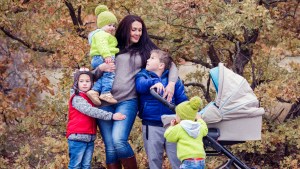Note to the reader: This kind of topic can trigger many different feelings and reactions, so please remember that I’m writing only about my own choices and what has worked best for me and my family. What I did might not be the right choice for you — only you know what’s best for you and your family.
***
When I was a little girl, I always figured I would grow up to be just like my grandma, Anamaria. She is a force to be reckoned with and the reigning matriarch of our family.
I want to tell you her story, a story I grew up cherishing, to help you understand why I chose to do things the way I did.
My grandma grew up in Cuba, and when she was a student at the University of Havana, the revolution in that country forced her to flee. She married my grandfather and they left on their wedding day, bringing nothing but the clothes on their backs.
Here in America, my grandparents embraced the country that took them in and offered them refuge. My grandfather served in the U.S. Air Force as a military doctor and my grandmother made a home for them in various cities and a military base, while welcoming and raising their six energetic children.
A new season
When my grandmother was in her 40s, all of her children were in school during the day, so she decided it was time for a “new season” in her life.
She has always been a person of formidable intellect and remarkable energy, so instead of taking that new season as a time to slow down and catch her breath after so many busy years with little ones at home, she decided to finish the college degree she had started and left unfinished many years ago.
Her own father, long deceased, had been a tenured professor and academic dean at the University of Havana. She felt that finishing her degree was a way to honor him and live up to his legacy.
So she enrolled as a commuter student at the local university. The decision wasn’t difficult because her husband had just joined the medical school faculty there, so as his wife, she had access to a steep tuition discount. She studied engineering, and after finishing her bachelor’s degree, she went on to get a master’s degree too.
Although there was a cultural mentality at the time that women were less likely to excel in STEM fields, my grandma said, “I never had any idea that I couldn’t do well in those areas.” Her father’s work as a mathematician inspired her to study a related field.
Her college and graduate school years led to a lot of delightful stories. She was named Sophomore of the Year at one point, and took classes with one of her daughters, who attended the same university.
Then she joined an engineering company and worked there for 25 years, until she was in her late 70s, before finally retiring. She still keeps in touch with a number of her colleagues from her professional years.
“I was touched by how many of my former co-workers and employees attended my husband’s funeral” (this past May), she told me.
As a young woman, I thought that my grandma’s way of doing things made so much sense. Babies first, then career.
The biological advantage
From a biological perspective, it’s easier to get pregnant in your 20s, and you have more energy to keep up with chasing little kids. Plus, if you have babies first and then a career, you never have to take a break from your career to have kids. Your professional years can be a unified trajectory.
So when I fell in love and got married in my early 20s, I talked it over with my husband, and we decided to do the same thing. Just like Anamaria, I would spend my 20s and 30s with a house full of babies, and then dedicate the later decades of my life to my chosen professional work. We jokingly think of it as “the Anamaria Option.”
I’ve been even luckier than my grandma was, though, in one important way. Working remotely wasn’t an option for her back in the 1960s.
Today, I am able to work professionally with four little ones 8 and under, thanks to remote work and flexible part-time hours (and the best coworkers, who are so understanding when a baby or toddler occasionally appears in a Zoom meeting!). I’m able to keep my skills up-to-date, so that it will be incredibly easy to “on ramp” when my kids are older and I’m ready to work full-time again.
Living longer
One important reason that this approach makes sense for me is that human beings are living so much longer than they used to. Scientists say that 90 is the new 40, that astonishing advances in longevity will extend the prime of our lives by decades.
This means we can expect to have many years of professional work, long after our bodies are able to bear children. It makes sense to me to capitalize on my youthful biology and elderly longevity and plan my childbearing years accordingly.
Of course, the really important drawback to my approach is that having kids when you’re younger means you may be less financially stable when you have them. So certainly some prudent discernment is needed there.
But the truth is that babies need a lot less than people think they do, and the Church calls us to be both “responsible and generous” in welcoming children. So this may not be a huge obstacle for everyone. Speaking for myself, I was happy to welcome my first baby in a little one-bedroom apartment; we didn’t live there for many years, but we found ways to make it work. We were young and in love and the whole thing seemed like a merry adventure.
Not for everyone
There are so many reasons this approach wouldn’t work for everyone: For starters, it depends on meeting and marrying the right person at a fairly young age! For another, starting your career later may affect how far you can advance professionally.
So this approach certainly isn’t going to be right for everyone. But the best endorsement, to me, is knowing that my grandma has no regrets. It was important to her to be home with her children when they were young, and then she really enjoyed having a second career later in life.
So for me, it made all the sense in the world to plan for babies first and a career second. And maybe it makes sense for you, too. I will have to report back to you in a couple of decades to see if I still feel that way about it in my 50s and 60s!




